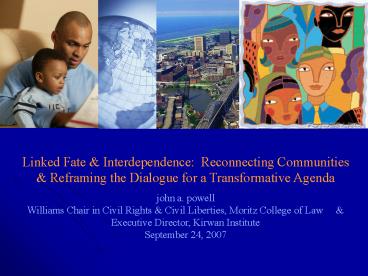Linked Fate - PowerPoint PPT Presentation
1 / 21
Title:
Linked Fate
Description:
... an overarching collective vision of shared fate not predicated on ... Grapes of Wrath. Next Steps: Communication Strategy. Next Steps: Communication Strategy ... – PowerPoint PPT presentation
Number of Views:29
Avg rating:3.0/5.0
Title: Linked Fate
1
Linked Fate Interdependence Reconnecting
Communities Reframing the Dialogue for a
Transformative Agenda john a. powellWilliams
Chair in Civil Rights Civil Liberties, Moritz
College of Law Executive Director, Kirwan
InstituteSeptember 24, 2007
2
Connectivity Mutuality
- We are all caught up in an inescapable network
of mutuality, tied in a single garment of
destiny. Whatever effects one directly effects
all indirectly.
-The Rev. Dr. Martin Luther King, Jr.
3
Linked FatesTransformative Change
- Our fates are linked, yet our fates have been
socially constructed as disconnected, especially
through the categories of class, race, gender,
nationality, religion
4
Our Current Paradigm
- Current paradigm Hobbesian, isolated, radically
individualistic - Perceives individuals as autonomous-independent
selves - Egoistic, possessive, separate, isolated,
rational - Role of state protect individualism and
individual property
5
Our Current Paradigm
- This has led to increasing isolation and fear of
the other - This framework creates and marginalizes the
racialized other - Creates false separations negates shared
humanity - As a result we are a nation divided, and have
failed to achieve true democracy
6
Effects of Current Paradigm on Social Justice
Work
- Within this framework, social justice work
- Overlooks opportunities for coalition building
- Is more fragmented and isolated
- May be competitive and divisive
- Can lead to guilt or disempowerment
- Is not connected to an overarching set of shared
values - Lacks a cohesive and
unified vision!
7
- Are we too individualistic or can we transcend
this disconnectedness?
8
A New Paradigm
- Individualism and interconnectivity
are not mutually excusive - When a linked correctly, interconnectivity
supports individuality - We believe this is possible through collective
imagination - A New Paradigm!
9
A New Paradigm
- What is the alternative vision?
- A model of connectedness
- Individuals as part of something bigger
- Inter-being, unified, not
egoistically separate
10
A New Paradigm
- Shared Fate
- This has been interpreted by some to be
synonymous with self-interest - This is too narrow -- as institutions shift, so
will individual or group interests - Need an overarching collective vision of shared
fate not predicated on
personal or group-based interests
11
Next Steps
- Now that we have this framework of connectedness
and shared fate, where do we go from here? - Need to separately consider
- internal analysis
- communication strategy
- programmatic approach
12
Next Steps
- Must be explicit about both internal AND external
communications strategy- these are not always the
same - Need to explore ways not only of talking about
race but also doing around race
13
Next Steps Analysis
- Understand your audience their dominant frames
- Different symbols animate different associates
with different groups - Need to first understand what that frame means to
different groups - Example-
freedom
14
Next Steps Communication Strategy
- Dont rely on highlighting disparities or
structures alone - May work best with some groups but not others
- Must connect the individual with the structures-
tell stories that use the personal to lift up the
structural - Grapes of Wrath
15
Next Steps Communication Strategy
- This story must activate the correct frame for
your audience - Priming- how an individual process information
depends on the frame that is activated - Can be explicit or implicit
- Example illegal alien
16
Next Steps Programmatic Approach
- Develop and implement solutions that benefit ALL
members of society - Linked fate
- Targeted Universalism
- Action- Linked intervention
- Focus on Turning Points
- Multiracial and multiethnic coalitions
- Shared communications strategy
17
Concluding Thoughts
- The obstacles we face can seem insurmountable,
however - Through a new paradigm and with coalition
building we can make great strides in addressing
the race and class disparities in our nation - Strategic transactional change, can ultimately
accomplish transformation - Eyes on the prize(s)
- Remember-
- We Have, and Can Make Progress!
18
Save the date
19
www.KirwanInstitute.org
Visit Us Online
www.KirwanInstitute.Blogspot.com
20
For Further Reading
- Bill Bradley
- The New American Story. (2007).
- Drew Westen
- The Political Brain The Role of Emotion in
Deciding the Fate of the Nation. (2007). - George Lakoff
- Whose Freedom? The Battle over America's Most
Important Idea (2007). - Thinking Points Communicating Our American
Values and Vision (2006). - Don't Think of an Elephant Know Your Values and
Frame the Debate--The Essential Guide for
Progressives (2004).
21
For Further Reading
- Reports Articles
- Thinking Change Race, Framing, and the Public
Conversation on Diversity. What Social Science
Research Tells Advocates About Winning Support
for Racial Justice Policies. Available online
through The Diversity Advancement Project
http//www.diversityadvancementproject.org/ - John Sterman. (1994). Learning in and about
complex systems. Systems Dynamics Review. Vol.
10, nos. 2-3 291-330. - Online tools
- Harvard Implicit Association Tests.
https//implicit.harvard.edu/implicit/demo/





![READ[PDF] The Fate of the Artist, Collector's Edition PowerPoint PPT Presentation](https://s3.amazonaws.com/images.powershow.com/10066632.th0.jpg?_=202406270411)





![DOWNLOAD [PDF] Lead Wars: The Politics of Science and the Fate of Amer PowerPoint PPT Presentation](https://s3.amazonaws.com/images.powershow.com/10132027.th0.jpg?_=20240917075)
![[PDF]DOWNLOAD How Big Things Get Done: The Surprising Factors That Determine the Fate of PowerPoint PPT Presentation](https://s3.amazonaws.com/images.powershow.com/10120490.th0.jpg?_=20240905128)
![[PDF]DOWNLOAD How Big Things Get Done: The Surprising Factors That Determine the Fate of PowerPoint PPT Presentation](https://s3.amazonaws.com/images.powershow.com/10102683.th0.jpg?_=20240820029)
![[PDF]DOWNLOAD How Big Things Get Done: The Surprising Factors That Determine the Fate of PowerPoint PPT Presentation](https://s3.amazonaws.com/images.powershow.com/10100536.th0.jpg?_=20240816112)




![get [PDF] DOWNLOAD Your Plate Is Your Fate: A Simple Guide to Understa PowerPoint PPT Presentation](https://s3.amazonaws.com/images.powershow.com/10082824.th0.jpg?_=20240722021)











